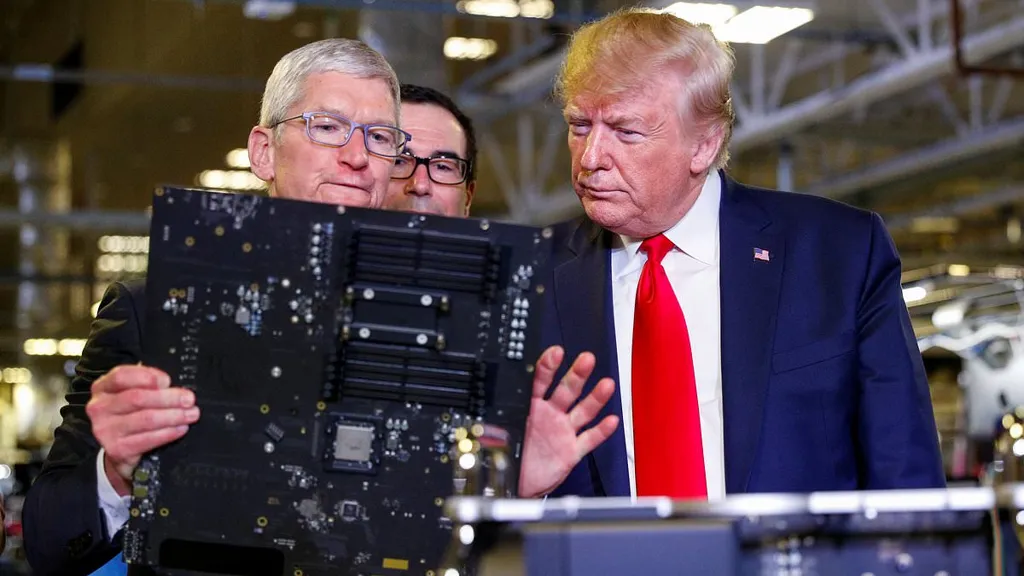Apple is scrambling to readjust its global supply chain amid concerns iPhones could soar in price due to Donald Trump's new tariffs on countries where they are made. The California-based company makes most of the devices in China, which the US President hit with a 54 per cent levy - a figure which could go up amid a trade war. Apple is thought to be ramping up iPhone shipments from India - which faces a lower 26 per cent tariff - to America as a temporary fix while it seeks an exemption.
Chief executive Tim Cook has a good relationship with Mr Trump and the firm will hope he can use this to encourage a U-turn after last Wednesday's announcement. During Mr Trump's first term in 2018, Mr Cook ensured Apple got an exemption for billions of dollars in imports of Chinese-made smartwatches and other components. But there has been no exemption this time so far - and analysts estimate the China tariffs could hike the cost of producing an iPhone from $580 (£450) to $850 (£660).
While experts have warned manufacturing the smartphone in America could see the purchasing cost skyrocket from $1,100 (£850) to $3,500 (£2,715). Apple's reliance on China for manufacturing has led to a 19 per cent collapse in its share price, which is their worst performance over three days in nearly 25 years. Ahead of the tariff announcement, Apple had been planning to produce 25million iPhones in India this year with up to 10million originally meant for local sale. But if Apple redirects all India-made iPhones to America, it could meet about half of US demand for the device this year, Bank of America analyst Wamsi Mohan said.
While Apple makes many iPhone components in China, more of the devices have been assembled in India in recent years - meaning it can label the country of origin as 'India'. The company could therefore offset some of the increased export cost by sending more phones to the US from India, according to the Wall Street Journal. 'Trump's new policies have thrown a wrench into Apple's supply chain gears, essentially negating the tariff-hopping that Apple targeted through diversifying production geographies,' Mark Zetter, an electronics supply chain expert, told The Telegraph.
'Apple moved some production to countries like Vietnam, Thailand, Malaysia, and India when the world was less polarised. But these strategies no longer apply.' The tech giant has been expanding Indian production since 2017 -- not just to dodge tariffs, but also to reduce its reliance on China and tap into India's fast-growing smartphone market. Despite growing investment in India and some US manufacturing, most iPhones are still built in China, where Apple's supply chain is deeply entrenched.
Wedbush analyst Dan Ives, a Wall Street tech expert, said: 'The economic pain that will be brought by these tariffs are hard to describe and can essentially take the US tech industry back a decade in the process while China steamrolls ahead. '50 per cent China tariffs, 32 per cent Taiwan tariffs would essentially cause a shut-off valve from the US tech landscape and in the process cause every electronic to go up 40 to 50 per cent for consumers. 'iPhones made in the US would cost $3,500 (vs. $1,000), and the AI Revolution trade would be significantly slowed down by these head scratching tariffs that need to be negotiated to realistic levels.'
Mr Cook had already made moves to woo Trump back in February when Apple announced it was planning to spend $500billion and hire 20,000 people in the US. 'We are bullish on the future of American innovation, and we're proud to build on our longstanding US investments,' Mr Cook said in a statement. The investment spread across Trump's second term includes opening a factory in Texas. The pair had met a week prior, the New York Times reported, in which Mr Cook outlined his plans to the US President. It led to Trump declaring afterwards in a speech: 'They're going to build here instead because they don't want to pay the tariffs.'
Mr Cook vowed during Trump's first term to build three new manufacturing plants in the US which the President said would be 'big, big, big'. Trump had criticised American companies for not producing in the US and said in 2016 'we're gonna get Apple to start building their damn computers and things in this country, instead of in other countries'. Mr Cook dined with Trump on the patio of his Mar-a-Lago residence in December a month after he took to X to congratulate him on winning a second term. He wrote: 'Congratulations President Trump on your victory! We look forward to engaging with you and your administration to help make sure the United States continues to lead with and be fueled by ingenuity, innovation, and creativity.' He was also among the plutocrats sitting side-by-side at Trump's inauguration.
Meta and Amazon both gave $1million to the inauguration fund, while Mr Cook personally donated another million. Mr Cook has so far remained tight-lipped about Trump's tariffs, only telling analysts during an earnings call in January: 'We are monitoring the situation and don't have anything more to add than that.' But their love-in appears to have strained since Trump unveiled sweeping tariffs last week, wiping billions from the tech giants' share prices. Russ Shaw, of Tech London Advocates, said: 'It was always an odd bromance to begin with; I think it was opportunism on both sides. Biden never reached out to the tech giants so Trump took advantage. A sobering reality has kicked in now.'
